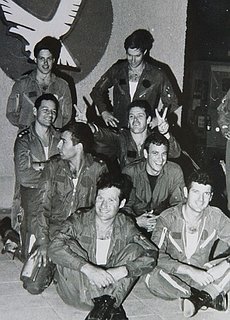 The strike pilots of Operation Opera, minutes
The strike pilots of Operation Opera, minutesafter their safe return. Then-Capt. Ilan Ramon,
at upper left, would later die in the space shuttle
Columbia disaster in 2003. Squadron leader
Col. Ze'ev Raz is at bottom right.
In the late 1970s, Saddam Hussein's government convinced France to sell Iraq an Osiris-class research reactor. Construction of the reactor and associated laboratory facilities (also provided by France) began in 1979. Fearing the reactor could, and would, be used to produce nuclear weapons, Israel pursued diplomatic negotiations with France to keep the reactor from coming online. The diplomacy failed.
By 1981, the reactor was ready for fueling. Menachem Begin, then Prime Minister of Israel, decided that the reactor must be destroyed before destruction of the plant could bring radioactive fallout to the surrounding civilian population.
Planning for the operation would be a daunting task. The Osirak reactor was more than 1,000 miles round-trip from Israel's air base in southern Israel. Further complicating the planning were the geographical necessities of flying over Jordan and Saudi Arabia, both countries decidedly not friendly to Israel. In the end though, the Israeli Air Force decided it was theoretically possible to launch with external extended range fuel tanks, strike the plant, and return safely to base.
On the afternoon of 7 June 1981, the Israeli Air Force launched eight F-16As, each loaded with two 1,000Kg (about 2,200lb) bombs and external tanks. Accompanying the F-16s were six F-15As to fly top cover and engage any unfriendly aircraft sent to intercept. On the way to the target, the aircraft would fly at an altitude of 150 feet to avoid radar detection. Definitely not the best altitude for fuel conservation.
According to Israeli diplomat Yehuda Avner, as the strike package was en route, Menachem Begin paced his office awaiting word on the mission. During these tense moments, Begin was cursing opposition leader Shimon Peres:
As the waiting continued, Avner writes, Begin also bitterly castigated Shimon Peres, the opposition leader, for having written to him a few weeks earlier "to ask me to desist from taking action. Hoss gehert aza meisa? [Yiddish for 'Have you heard of such a thing?']," Begin stormed, according to Avner.An hour and a half after launch, the strike aircraft climbed to 40,000 feet, then dove on the target. Each pilot released his two bombs, and all 16 bombs struck the plant, although two may have failed to detonate. Miraculously, all 14 of the Israeli aircraft, running nearly on vapors, made it back to their base in southern Israel without a scratch. Ten Iraqi soldiers and a French scientist died in the attack.
Upon receiving word of the operation's success, Begin phoned Sam Lewis, US ambassador to Israel. The reaction was less than enthusiastic:
"I have to tell you in all honesty that I suspect some people in the White House will be pretty furious about this," said a shocked Lewis. "Your weaponry was procured from us under the Arms Export Act, for purposes of self-defense only."
"Self-defense?" Begin retorted. "What greater act of self-defense could there be than to demolish Saddam Hussein's weapons of mass destruction, designed to bring Israel to its knees, kill our people, vaporize our infrastructure - in a word to destroy our nation, our country, our existence? Over these past months I've told you again and again, Sam, that either the US does something to stop that reactor, or we will have to."
Shamefully, the UN Security Council passed resolution 487 demanding that Israel place its nuclear program under IAEA monitoring and declaring that Iraq was entitled to compensation. The US, much to its disgrace, supported the resolution and temporarily withheld a shipment of promised aircraft to Israel.
Today, Operation Opera's legacy has undergone something of a "rehabilitation" in the US, and is regarded much more favorably. But regardless of world reaction, it stands as testimony to the courage and determination of the Israeli people. May the rest of the world find similar courage in dealing with Iran's nuclear threat.
Update: The Fredericksburg Free Lance-Star published this piece as an op-ed column on 7 June.

No comments:
Post a Comment